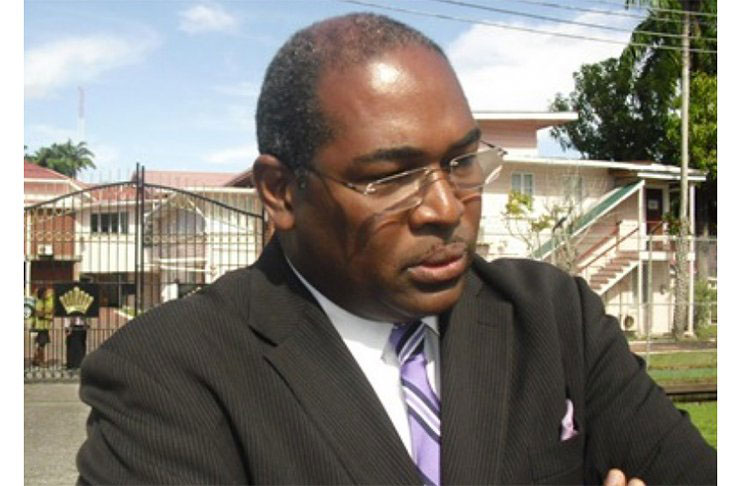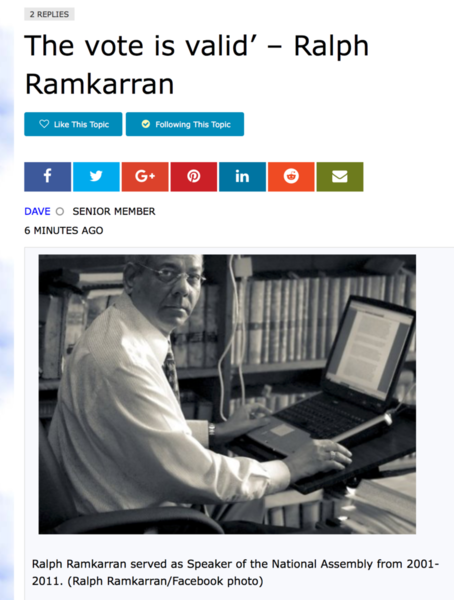‘Motion not carried’
…Speaker may review no-confidence vote
…as legal opinions swirl over one-half plus one
…UK similarities seen in what constitutes a majority
SPEAKER of the National Assembly, Dr Barton Scotland may be asked to rule at the next sitting that the vote of no-confidence in the government was not carried, even as legal opinions regarding a mathematical formula continue to make the rounds in the public domain.
Following the debate of the motion and Charrandas Persaud shockingly voting with the opposition to oust the government, Dr Scotland in his closing remarks, although stating that the motion had been carried, said that the “consequences” will be dealt with at another time. “Honourable members, you’ve heard the results of the vote– 33 in favour and 32 against, it means that the motion is carried. What happens hereafter honourable members is that we will continue the work; we will complete the work of this evening and then we will deal with the consequences of this,” he said.

A top attorney in the country had stated on Monday that with the National Assembly being an independent arm of the State, the Speaker at the next sitting of the House can be invited to revisit his interpretation. “I would imagine the Speaker, being as prudent as I know him to be, would probably seek the advice of senior counsel locally and internationally to assist him in the interpretation of that section,” attorney-at-law Nigel
Hughes had stated.
Meanwhile, contacted on the issue on Wednesday, Attorney General Basil Williams would only say that the Cabinet Sub-committee, working to examine all the legal opinions surrounding the no-confidence motion, continued its work on Wednesday under his chairmanship. The other members of the committee are: Vice President and Minister of Foreign Affairs, Carl Greenidge; Minister of Public Security Khemraj Ramjattan and Minister of Natural Resources Raphael Trotman. In a statement on Monday, government stated that Cabinet examined all of the legal and constitutional aspects of the vote in the National Assembly on Friday and referred the matter to the sub-committee. That sub-committee’s task is to examine all the legal opinions available and report to Cabinet today with recommendations on the way forward.
UK using same formula
Meanwhile, the mathematical means being suggested by a number of local and international attorneys to settle Guyana’s vote of “majority” in the House is not unfounded as the United Kingdom (UK), just recently, used the same formula although at the end, Prime Minister Theresa May won by several votes clear.
Since the vote on the motion– 33:32 on December 21, 2018, legal arguments have surfaced stating that the number of votes which carried the motion is inadequate. With one-half of the House mathematically equaling to 32.5 members, half of the House would therefore be 33 members, thereby suggesting that a total of 34 votes would be needed to secure the majority.
In one of the most recent and similar cases this month, UK Prime Minister Theresa May won the confidence vote regarding her leadership after it was challenged by a number of Conservative Members of Parliament. However, prior to the vote, international news agencies widely reported that May needed “at least 159 out of 315 Conservative MPs” to win by a simple majority.
Similar to Guyana’s uneven number of 65 sitting members of the National Assembly, when the UK’s 315 total is divided, it arrives at 157.5 members.
This figure was rounded off to158 as what represents half of the total number of members while an extra vote [159] would represent a majority.
This is cited in a CNBC article on December 12 titled ‘UK Prime Minister Theresa May wins confidence vote, but faces uphill battle to pass Brexit deal’ where it states: “May needed a simple majority (at least 159 out of 315 Conservative MPs) to win the confidence vote. Winning this vote means her leadership cannot be challenged for another year now.” May eventually secured 200 votes, staving off the motion.
Hughes had also put forward, this week, a number of other cases where a similar case of what constitutes the “majority” was debated. These included the Kliman v Speaker of Parliament of the Republic of Vanuatu; Hughes v Rogers Civil Suit 99 and 101 of 1999. Anguilla. Delivered Jan 12, 2000.
Unchartered waters
The passing of the motion puts Guyana somewhat in ‘unchartered waters’ as, should it ultimately be approved, it would be the first time that the government would have to resign to hold elections in 90 days.
According to a post made yesterday on social media by the Office of the Prime Minister, it stated: “Guyana has entered unchartered waters with that vote, and legal opinions have since been expressed, and are being expressed, as to whether it satisfies requirements of the Constitution for the resignation of the duly elected government. In the meantime, the government remains at work.”

It is suspected that with the new interrogations regarding the legitimacy of the no-confidence motion and the legal interpretations of what constitutes a majority, the government may very well request a revision. As for Persaud, while several persons from the opposition have hailed him a “hero,” others, in their observations of how the events played out, are questioning the involvement of the Opposition and their affiliates.
Some are even speculating that the former MP received payment in return for his sound position of “yes, yes, yes” during the Friday evening unfolding. Persaud, who fled the country shortly after his vote, has since denied the latter, stating that his vote against the government was guided purely by his “conscience”.
However, should it ever be revealed that the former MP had indeed colluded with outside forces and, more importantly, accepted a bribe in exchange for his vote, legal consequences could result. The House is expected to convene again on Thursday, January 3, 2019.



